***Content warning: the family violence referred to in this article includes spousal physical abuse and neglect.***
I’ve never known much about either of my maternal great-grandmothers. Cora Siebenburgen, my grandfather’s mother, died over a decade before I was born, and Helen Gravett, my grandmother’s mother, passed away when I was close to three. Recently, through the combined power of ancestry.com and newspapers.com, I’ve discovered these two women shared something in common: they were both issued a divorce on the grounds of neglect.
I’d grown up knowing about Helen’s divorce because she remarried and had a different last name than my great-grandfather. Cora’s divorce I only looked into recently after my mom mentioned that Cora had children from another marriage. A few ancestry.com records and a targeted newspapers.com search later, I’d found that her name at the time of her first marriage was Cora Gregory.
Filing for divorce
I’m not sure if it was a legal requirement to have this information published or was just the custom of the time, but the first information that appears about Cora and Helen’s respective divorces were announcements in The Cincinnati Enquirer stating they were seeking divorce. Both women cited cruelty and neglect.
Cora’s divorce - 1912
About a month and a half after the article ran stating Cora was seeking a divorce, another news item appeared that said she’d been granted the divorce and given custody of her two children. At the time of the divorce, her husband was in jail for some type of financial fraud. The term cruelty doesn’t appear in this announcement, and I’m not sure whether she was granted divorce on those grounds.
Divorce might have been rarer in the early 20th century than it is now, but Cora’s divorce announcement was listed alongside the stories of ten other women seeking divorce in a subsection of the paper titled, “News of the Courts.”
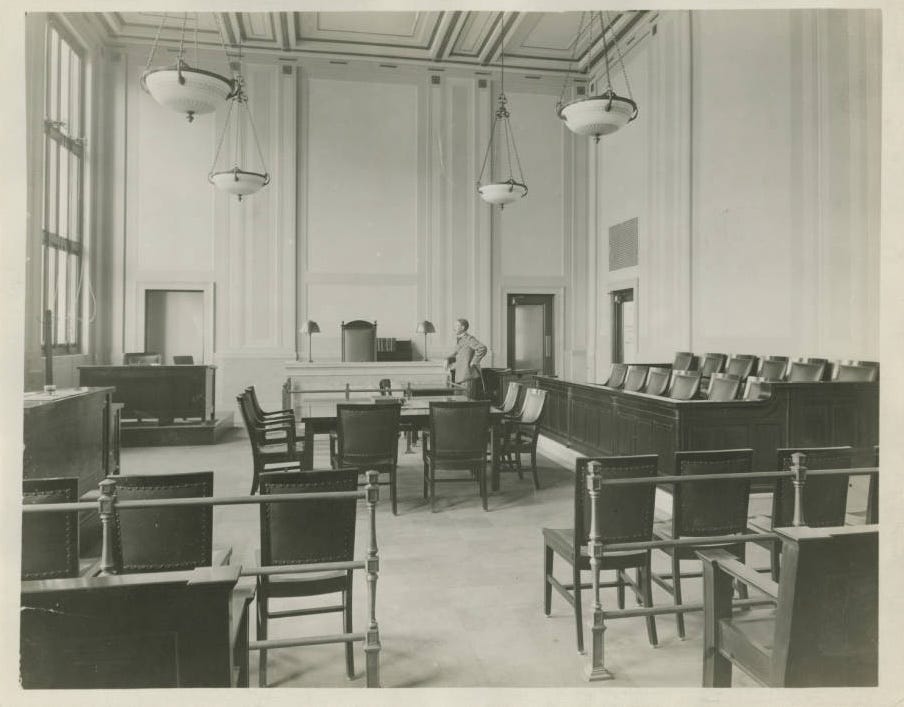
Helen’s divorce - 1934
News of Helen’s divorce finalization appeared in a short article in the paper bearing what might be the most insensitive headline of all time, “He Didn’t Have Time.” The headline references the fact that after kicking my great-grandmother, my great-grandfather told her that “he would ‘kill her’ if he ‘had time’.” The article also suggests that my great-grandfather was having an affair with another woman and names the woman (whom he would eventually go on to marry). It’s stated that Helen was granted a divorce on the grounds of neglect. Cruelty isn’t specified as the cause for divorce even though the article includes descriptions of physical abuse.
Private matters vs. public records
When I talked to my mom about what I’d found in the papers about her grandmothers, she told me she’d never heard about the abuse from either of them directly. She did know that Helen’s divorce was a bitter one because of the other woman involved who would become my mom’s step-grandmother.
Given that my great-grandmothers weren’t open with my mom about their experiences, it feels strange for me to be writing about them publicly. At the same time, their stories were printed in newspapers and are part of the public record, so what I’m sharing is already available on the internet.
Obituaries
One other commonality between my great-grandmothers is that their last names from their first marriages appear in their obituaries, even though in both cases about fifty years passed between their divorces and their deaths. Both of them had children by their first husbands, so I wonder if the inclusion of their former last names had something to do with these children being cited in the text.
Resilience
It’s Women’s History Month, and here on Substack a lot of folks in the family history and genealogy community are sharing stories about their female ancestors. Women are more difficult to track through public records because their names change with marriage. Also, the way the spent their time and their achievements weren’t documented to the same degree that men’s were.
I don’t have many stories about my great-grandmothers, but I do think the stories of their divorces speak to their resilience. As the news article about Helen indicates, she was supporting herself and her children working as a stenographer. I’m not sure what options were available to Cora, but I do know she married my great-grandfather within a year after her divorce and her occupation is listed as “Domestic” on the marriage certificate.
Without the news coverage, the stories of their divorces might have been lost to history. Would they have preferred it that way? Should I be keeping what was a matter of public knowledge at the time secret out of respect for them? Or am I reclaiming my family history by acknowledging the bad with the good?





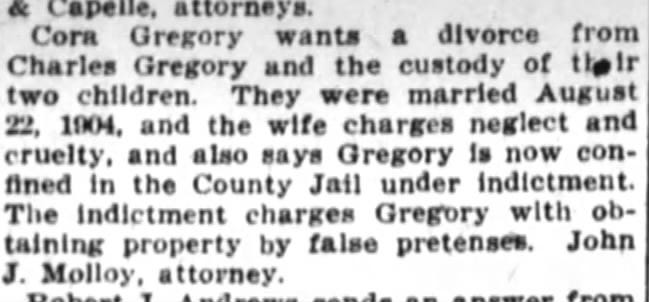
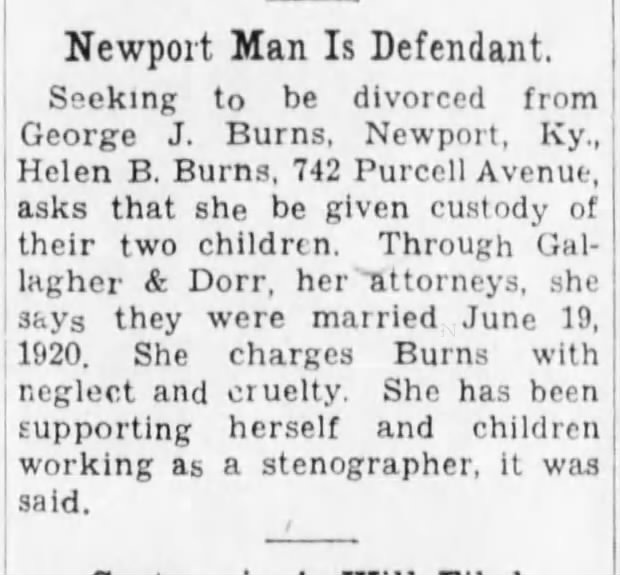
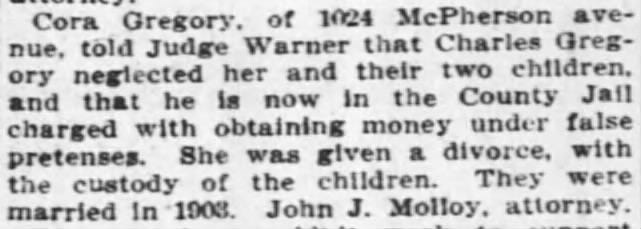
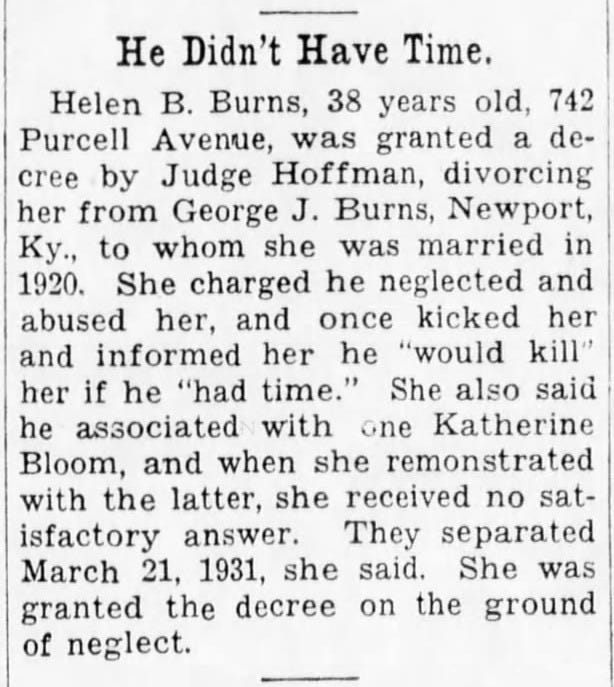
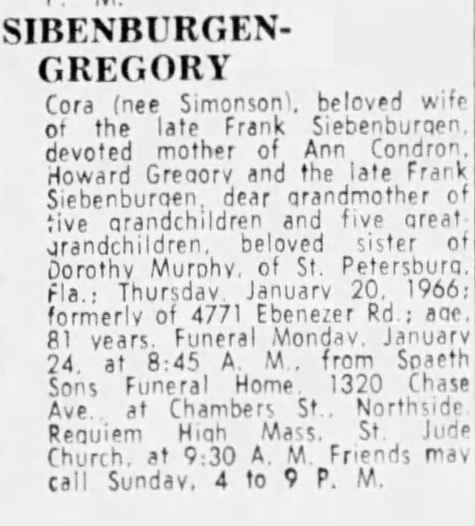
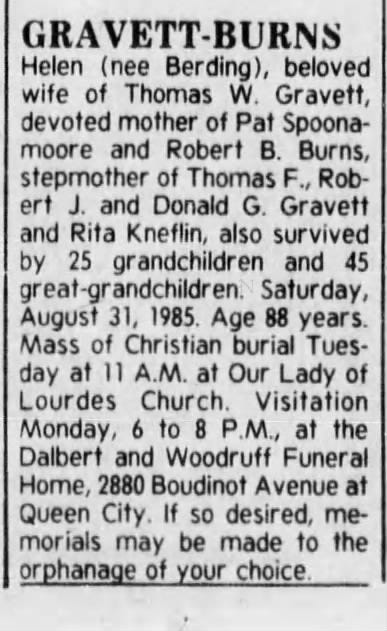
So crazy that they kept their names in the obituary. You should have included that awesome picture I have of George in his wrestling outfit. Aunt Ann said when he got mad he turned completely red, he sounded like a fire ball of a man!